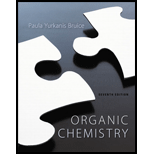
Interpretation:
- The proximity effect controls the kinetic product, the reason has to be predicted.
Concept Introduction:
Reactions of conjugated dienes:
An electrophilic addition reaction to a conjugated diene forms both
Kinetic and
Kinetic product: The more rapidly formed product is called the kinetic product. The reactions that produce the kinetic product as the major product are said to be kinetically controlled. The kinetic product predominates when the reaction is irreversible.
Thermodynamic product: The more stable product is called the thermodynamic product. The reactions that produce the thermodynamic product as the major product are said to be thermodynamically controlled. The thermodynamic product predominates when the reaction is reversible.
Rule: The stabilities of carbocation are,
Want to see the full answer?
Check out a sample textbook solution
Chapter 8 Solutions
Organic Chemistry
- Explain why a methoxy group (CH3O) increases the rate of electrophilic aromatic substitution, but decreases the rate of nucleophilic aromatic substitution.arrow_forwardThe compound below can be prepared with an alkyl iodide and a suitable nucleophile. Identify the alkyl iodide and the nucleophile that you would use. For an anionic nucleophile, you do not need to draw the counterion.arrow_forwardGood nucleophiles that are weak bases favor substitution overelimination. Explain this ?arrow_forward
- Rank in terms of reactivity towards the nucleophile. 1=least 4=mostarrow_forwardWhich is the better nucleophile in a protic solvent, chloride ion or bromide ion? Try to explain this in terms of the nature of the chloride ion and the bromide ion.arrow_forwardGive the products of the following substitution reactions. For every reaction, show electron pairs on both nucleophile and leaving group.arrow_forward
- Explain why quinuclidine is a much more reactive nucleophile than triethylamine, even though both compounds have N atoms surrounded by three R groups.arrow_forwardWhich nucleophile would prefer simple addition over conjugate addition? CH3MgBr NaCN CH3CH2NH2 (CH3CH2)2CuLiarrow_forwardrank these from least to most reactive in nucleophilic acyl substitution with a nucleophile I)CH3COOC2H5 II) CH3COO-Na+ III)CH3COCl IV) CH3CONH2arrow_forward
- 2. Draw the structures and explain why CH3CH₂O and CH3CO₂ are good nucleophiles but CH3SO3, water, and alcohols (R-OH) are poor nucleophiles. Propose a 'cutoff' for the amount of negative charge needed to be a good nucleophile. CH3CH₂O CH3CO₂ CH3SO3 H₂O CH₂OHarrow_forwardWhy do cis-1-bromo-2-ethylcyclohexane and trans-1-bromo-2-ethylcyclohexane form different major products when they undergo an E2 reaction?arrow_forwardDuring a Friedel-Crafts alkylation, the order in which the reagents are mixed is important. Generally, these reactions are done by slowly adding the alkylating agent to the aromatic component. What is the advantage of mixing the ingredients in this order rather than slowly adding the aromatic component to the alkylating agent? + AICI3 + AICI3 add add slowly slowlyarrow_forward
 ChemistryChemistryISBN:9781305957404Author:Steven S. Zumdahl, Susan A. Zumdahl, Donald J. DeCostePublisher:Cengage Learning
ChemistryChemistryISBN:9781305957404Author:Steven S. Zumdahl, Susan A. Zumdahl, Donald J. DeCostePublisher:Cengage Learning ChemistryChemistryISBN:9781259911156Author:Raymond Chang Dr., Jason Overby ProfessorPublisher:McGraw-Hill Education
ChemistryChemistryISBN:9781259911156Author:Raymond Chang Dr., Jason Overby ProfessorPublisher:McGraw-Hill Education Principles of Instrumental AnalysisChemistryISBN:9781305577213Author:Douglas A. Skoog, F. James Holler, Stanley R. CrouchPublisher:Cengage Learning
Principles of Instrumental AnalysisChemistryISBN:9781305577213Author:Douglas A. Skoog, F. James Holler, Stanley R. CrouchPublisher:Cengage Learning Organic ChemistryChemistryISBN:9780078021558Author:Janice Gorzynski Smith Dr.Publisher:McGraw-Hill Education
Organic ChemistryChemistryISBN:9780078021558Author:Janice Gorzynski Smith Dr.Publisher:McGraw-Hill Education Chemistry: Principles and ReactionsChemistryISBN:9781305079373Author:William L. Masterton, Cecile N. HurleyPublisher:Cengage Learning
Chemistry: Principles and ReactionsChemistryISBN:9781305079373Author:William L. Masterton, Cecile N. HurleyPublisher:Cengage Learning Elementary Principles of Chemical Processes, Bind...ChemistryISBN:9781118431221Author:Richard M. Felder, Ronald W. Rousseau, Lisa G. BullardPublisher:WILEY
Elementary Principles of Chemical Processes, Bind...ChemistryISBN:9781118431221Author:Richard M. Felder, Ronald W. Rousseau, Lisa G. BullardPublisher:WILEY





